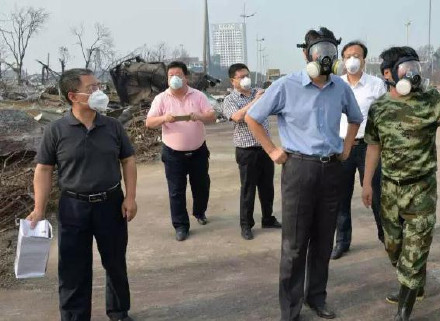Chen Jining, Minister of Environmental Protection, wears professional protective equipment to enter the explosion core area
After the explosion accident in Tianjin, cyanide disposal received much attention from the outside world. Ministry of Environmental Protection Minister Chen Jining, a water pollution control expert, went to the scene of the accident twice to discuss work involving the disposal of wastewater containing cyanide.
According to Niuyueguang, deputy director of the Fire Bureau of the Ministry of Public Security, due to the destruction of the office building of Ruihai Company, the cargo records are unclear. The number of specific hazardous chemicals is yet to be finalized, but the number of hazardous chemicals that can be confirmed is about 3,000 tons. At the press conference on the 19th, He Shushan, deputy mayor of Tianjin, said that the current dangerous goods are divided into 7 categories, about 40, divided into three categories, the first being oxides, and 1,300 tons of ammonium nitrate and potassium nitrate; The second type of flammable solids, metal sodium, magnesium, about 500 tons; the third category is highly toxic, sodium cyanide-based, about 700 tons. He Shushan said that there are many types of hazardous chemicals in the core area and it is more complicated. A total of hundreds of anti-chemical warfare troops and experts are at the scene of the accident.
After the incident, the cyanide alarm continued to hung.
On August 16, Chen Jining went to Tianjin and held a symposium. As the top leader of the environmental protection department and an expert in water pollution control, Chen Jining proposed three points at the time: First, strengthen the monitoring of atmospheric environment at the scene, carefully and scientifically do a grid monitoring program, and continuously monitor the flue gas treatment process. Cyanide should be investigated and soil pollution monitored at the same time. The second is to deploy monitoring forces from across the country to support Tianjin's work and resolve the problem of insufficient monitoring personnel. The third is to strive for the second time to advance the sewage treatment work. It must be completed before the arrival of rain.
It was reported that at 20:00 that evening, Chen Jining went to many cyanide wastewater disposal sites and asked in detail about the situation in which the staff used activated carbon to treat wastewater, to check the status of the plugging of wastewater wells, and from time to time asked engineers and technicians around them about the technology. In detail, we must guard against dripping before the arrival of rain. We cannot allow a drop of water to leak.
At 22 o'clock on the evening of August 18, two days later, Chen Jining went to the scene of the accident in Tianjin. Disposal of cyanide-containing wastewater is still one of its focuses. Chen Jining requires strict precautions against accidental waste water. With regard to the connection and blocking of upper and lower pipeline networks in the core area and outside the water bodies and pipelines, they are again closely investigated to prevent accidental outflow of wastewater. It is necessary to improve the emergency measures for the impact of rainwater, do a good job in the emergency treatment of rainfall, and strictly prevent accidental wastewater overflow. At the same time, accelerating the disposal of accidental wastewater in the core area and doing a good job of preventing and controlling the risk of soil pollution.
Chen Jining also proposed to further strengthen the strength of the expert group, carry out theoretical analysis, and provide scientific guidance for the next step of disposal.
On August 20, Chen Jining held a meeting in Tianjin to study the layout and treatment of wastewater containing cyanide. China Environmental News reported that Chen Ji-Ning took the risk on the day and came to the water hole in the core area of ​​the accident explosion to check the water situation on the spot, and discussed with the accompanying experts and staff on the next disposal arrangements.

The on-site picture shows that Chen Ji-ning wearing professional protective equipment entered the explosion core area to check the situation on the day.
In fact, Chen Jining is no stranger to handling sudden environmental pollution incidents. As early as 2006, when major pollution occurred in the Songhua River, Chen Jining assisted the State Environmental Protection Administration as an expert in pollution treatment and obtained the name of an expert on water pollution control. In 2001 and 2004, Chen Jining successively presided over the "Tenth Five-Year Environmental Planning of the Liaohe River Basin" and the "National Non-point Source Pollution Control Policy Framework and Action Plan."
At the same time, after the Tianjin explosion, the Ministry of Environmental Protection urgently deployed emergency monitoring forces to aid Tianjin. Organized 94 environmental monitoring stations in China and 94 environmental monitoring professional technicians in Beijing, Jiangsu, Hebei, Henan and Shandong to carry 25 emergency monitoring vehicles, more than 100 sets of portable rapid detectors and some laboratory equipment, and quickly started environmental emergency work. .
Some cyanide disposal experts also arrived in Tianjin synchronously. The Ministry of Environmental Protection organized its affiliates and experts from some famous universities and scientific research institutes such as Tsinghua University and Peking University to provide technical support. The research fields of these experts mainly include cyanide disposal, water pollution control, air pollution control, groundwater treatment, and soil risk prevention and control.
kaiping aida sanitary ware technology co.,ltd , https://www.kpfaucets.com